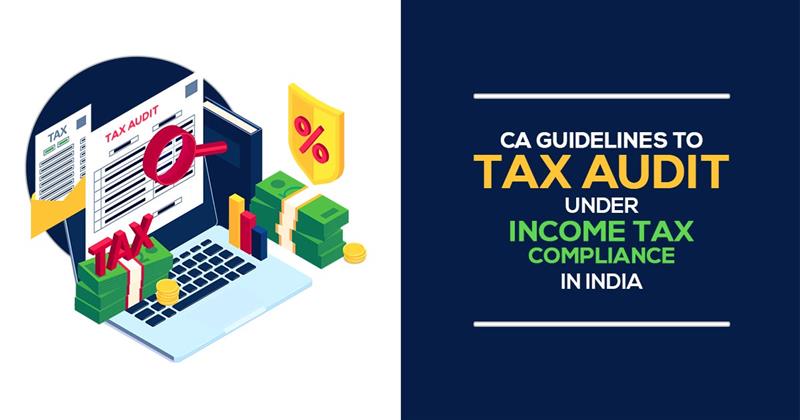
Under the Income Tax Act, 1961, for businesses and individuals, a tax audit is an essential procedure that ensures precise reporting of their income and financial information. For Chartered Accountants (CAs), it involves an effective analysis of a company’s financial records to validate that they are complying precisely with tax norms and reporting rules. Section 44AB emphasises when a tax audit is needed for businesses and professionals who make more than the specific income levels. The same guide elaborates on the objective of tax audits, the obligations of CAs, essential due dates, and effective tips for performing the audits in compliance with the law.
The new rule states that a company of a CA can not classify or share a maximum of 60 tax audits among its partners.
The dictionary defines the term ‘Audit’ as “An official inspection of an organization’s accounts and production of a report, typically by an independent body a systematic review or assessment of something”.
The Objective of Tax Audits Under Chartered Accountant Firm:
- Maintain and check the correctness of the account books, as well as to ensure tax auditor certification.
- The report noted/observed discrepancies after a thorough, methodical examination of the Account Books.
- Report details like tax depreciation, compliance with various provisions of income tax law, etc. This not only saves time but also fast tracks the income tax verification procedure for tax authorities. Important fields in the ITR include total income, claim for deductions, etc.
What is Tax Audit u/s 44AB?
For certain businesses and professionals based on turnover, gross receipts, or presumptive taxation rules, a tax audit u/s 44AB of the Income-tax Act, 1961, is an obligatory compliance. A revised Guidance Note in 2025 has been released by the ICAI, citing the audit process and documentation standards for CAs.
A tax audit may be applicable if your business surpasses Rs 1 crore turnover (or Rs 10 crore in digital mode cases).
Who Is Required to Get a Tax Audit?
According to Section 44AB, the following categories require a tax audit:
| Category | Threshold |
| Business (General) | Turnover > ₹1 crore |
| Business (Digital mode ≥ 95%) | Turnover > ₹10 crore |
| Profession | Gross receipts > ₹50 lakh |
| Section 44AD (Presumptive Business) | Declares income < 6%/8% of turnover |
| Section 44ADA (Presumptive Profession) | Declares income < 50% of receipts |
| Section 44AE/44BB/44BBB | If not following the presumptive scheme |
Note: Even those not otherwise liable may need a tax audit if they claim losses or switch tax regimes.
Modifications in ICAI Guidance Note (Revised 2025)
The Institute of Chartered Accountants of India (ICAI) updated its Guidance Note on Tax Audit in 2025. Key additions possess:
- Clarity on reporting crypto transactions and foreign payments.
- Audit approach for gig economy workers, influencers, and e-commerce sellers.
- Mandatory disclosure of GST turnover reconciliation.
- Format changes in the reporting of related party transactions.
- Integration with Clause 44 (break-up of total expenditure under GST registered/unregistered vendors).
Employed Auditors: No Conflict of Interest
To ensure zero conflict of interest, section 44AB mandates a tax audit under an independent chartered accountant/firm. An employed internal auditor of the assessee cannot conduct an internal tax audit.
The Council of ICAI in its 281st meeting held from 3rd to 5th October 2008, decided that an internal auditor of an assessee, whether working with the organization or independently practising chartered accountant or a firm of chartered accountants, cannot be appointed as his tax auditor. The decision was made effective from 12-12-2008.
Audit Requirements
The table below lists those categories of individuals/groups that need the audit services of a Chartered Accountant:
|
Taxpayer |
Conditions for Audit |
|
Traders/Merchants(opting for presumptive taxation scheme) |
If turnover, total sales/receipts in a given FY is greater than Rs. 2 crores. |
|
Salaried Person(Professional) |
If Annual Gross receipt is greater than Rs 50 lakhs |
|
Business Owner(Not opting for presumptive taxation scheme under section 44AD) | If turnover, total sales/receipts in a given FY, is greater than Rs. 2 crores. |
|
Business owners eligible for presumptive taxation under Section 44AE, 44BB and 44BBB | If turnover, total sales/receipts in a given FY, is greater than Rs. 1 crore. |
Read Also: How Legal Audit Can Help Business Become More Effective
The Final Audit Report and Non-Compliance
Tax Auditor must submit the audit report as part of either Form 3CA or Form 3CB, where:
- Form No. 3CA is used for those businesses, professionals or individuals mandated for audit under some other law.
- Form No. 3CB is used for those businesses, professionals or individuals not mandated by any other law.
In addition to either of the two forms, the auditor also needs to provide prescribed details in Form No. 3CD. Form No. 3CD, along with either Form 3CA or Form 3CB, complete the audit report.
Last but not least, unless there is an acceptable reason for failure, non-compliance with tax audit would attract a penalty amounting to 0.5% of total sales/turnover/gross receipts or Rs 150,000 (whichever is lower).
Forms, Clauses & Filing Procedure
A Tax Audit comprises preparing the audit report in Form 3CA/3CB and detailed disclosures in Form 3CD. Below is the breakdown:
| Form | Used For |
| Form 3CA | If accounts are already audited under other laws (like the Companies Act) |
| Form 3CB | If no other audit is applicable |
| Form 3CD | Statement of particulars (34 clauses) |
Notable Clauses in Form 3CD:
- Clause 8: Method of accounting
- Clause 12: Valuation of stock
- Clause 21: Deductions under Chapter VI-A
- Clause 26: Section 43B payments
- Clause 34: TDS/TCS compliance
- Clause 44: GST expenditure bifurcation
Due Dates for Tax Audit – AY 2025–26
| Category | Due Date |
| Non-transfer pricing cases | 30 September 2025 |
| Transfer pricing cases (Section 92E) | 31 October 2025 |
For delay, the penalty is: ₹1.5 lakh or 0.5% of turnover, whichever is lower (Section 271B).
Major Sections Included in the Books of CA Firm:
#1. The Act
The primary task of an accountant is to conduct tax audits. The sub-clause (i) under section 44AB of the Chartered Accountants Act defines the term “Accountant”. For this section, the term “Accountant” refers to the same meaning as defined under sub-section (2) of section 288 in the Chartered Accountants Act of 1949. However, with effect from 1.04.2014, section 226 of the Companies Act, 1956, is now replaced by section 141 in the Companies Act, 2013.
The ACT says, ” “Accountant” means a chartered accountant within the definition of Chartered Accountants Act, 1949 (38 of 1949) and includes, in connection to any State, any individual, who by virtue of the provisions of sub-section (2) of section 226 of the Companies Act, 1956 (1 of 1956), is entitled to be authorized to act as an auditor of companies recorded in that State.”
#.2 The Auditee
The amendments introduced post the introduction of the Finance Act, 2001, necessitates tax audits to be carried out by a professional chartered accountant only.
The provisions under section 44AB of the Chartered Accountants Act lay the rules by which the auditee has to be audited. The accounts must be audited in utter compliance with the provisions of this section. The tax audit reports on business or profession audited under such other law must be reported or furnished by the tax Authority specified dates under section 44AB.
Objectives Towards the Tax Audit
This is implemented to take upon the following objectives
So to make sure that the proper subsistence and exactness of the account records and certification of these through the assessee.
Reporting the observation known via the tax auditor post investigation of the accounts.
To report the prescribed details like tax depreciation, compliance with various provisions of income tax law, etc.
All these will enable the tax authorities to verify the exactness of the ITR furnished through the assessee. The computation of the total income, claim towards the deduction, etc, is then simpler.
Note:
- Assessee like co-operative societies whose accounts have been audited by a person other than a chartered accountant, the tax audit will have to be conducted by the ‘accountant’ as defined under section 44AB.
- Audits can also be formed by a chartered accountant’s firm. The respective firm member signs or validates the audit report on behalf of the firm as a partner in the firm.
- The audit report, signed in individual or membership capacity, must mention the membership number. The membership number must be shared during registration on the e-filing portal.
Audit Exemption for Digital Transactions
No tax audit is needed for the business u/s 44AB(a) if exceeding than 95% of receipts and payments are accomplished digitally and turnover is less than ₹10 crore. Keep appropriate bank statements, UPI logs, and payment gateway reports as proof.
Practical Tip from Efiletax Expert
Although the audit threshold may appear to be more lenient because of the digital payment regulations, many small businesses still face audits due to non-compliance with presumptive income norms or inadequate bookkeeping practices. Chartered Accountants (CAs) need to take the initiative to educate their clients about Clause 44, which pertains to GST-related expense reporting, as this is now being closely scrutinized during audits.







